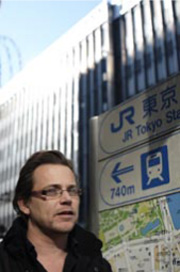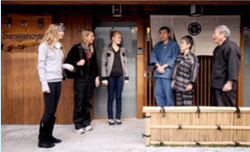Home > Highlighting JAPAN > Highlighting Japan JANUARY 2011 > Tips for the Traveler
Highlighting JAPAN
COVER STORY: The Spirit of Hospitality
Tips for the Traveler

Local authorities across Japan have made an effort to increase the amount of foreign-language signage. Navigating the capital city in particular is now straightforward.
Credit: ALFIE GOODRICH
Transport
Most parts of Japan are well served by the nation's world famous rail network. Getting around is quick and easy. Major stations now carry signage in at least one foreign language, while announcements on many trains are made both in Japanese and English.
For foreign visitors who mean to travel any distance beyond Tokyo, the Japan Rail Pass is highly recommended. The pass, which must be purchased from a travel agency outside Japan, allows unlimited travel on all JR lines. The current cost for an adult pass is 28,300 yen for seven days and 45,100 yen for a fortnight. For details, go to www.japanrailpass.net/.
For details of some of the other travel passes available to the foreign traveler in tokyo, go to www.jnto.go.jp/eng/arrange/attractions/practical/tonai_ticket.html
Accommodation
Some of the world's most luxurious hotels are to be found in Tokyo, offering service levels perhaps unrivaled anywhere. However, you do not need to be wealthy to enjoy high-quality accommodation in the capital or anywhere else in Japan.

Sawanoya ryokan in Tokyo charges around 5,000 yen a person per night, and like many such inns of its scale, is proving increasingly popular with foreign guests.
Credit: TADASHI AIZAWA
Caution: Visitors to Japan should be aware of the peak times of the year for booking travel and accommodation, which are: the New Year holiday, December 27 to January 4 and adjacent weekends; the Golden Week holiday season of April 29 to May 5 and adjacent weekends; and the Bon festival season in mid August.
Entertainment and Dining Out
Once you have arrived at your chosen destination in Japan, the best way to get a feel for the area is on foot, which has the additional benefit of being free. Walking the streets of Tokyo and anywhere else in Japan also has the quality of being entirely safe. Resist the temptation to hop from sightseeing spot to spot, and instead savour the atmosphere of a meandering walk off the beaten track. Mosey into a park or the grounds of a shrine. There may be no better city than Tokyo in which to get lost!
In popular sightseeing districts many restaurants now offer menus in English, but you have nothing to fear from those which do not. Equally, do not be put off by the low prices visible on many menus. It is extremely rare to be served a bad meal at a restaurant in Japan.
A steaming bowl of toothsome buckwheat soba noodles can be had for as little as 300 yen, ramen noodles or "curry rice" for 600 yen, and bento boxed lunches for much the same reasonable price. At lunchtime, go where the local workers go; in the evening, likewise!
© 2009 Cabinet Office, Government of Japan






